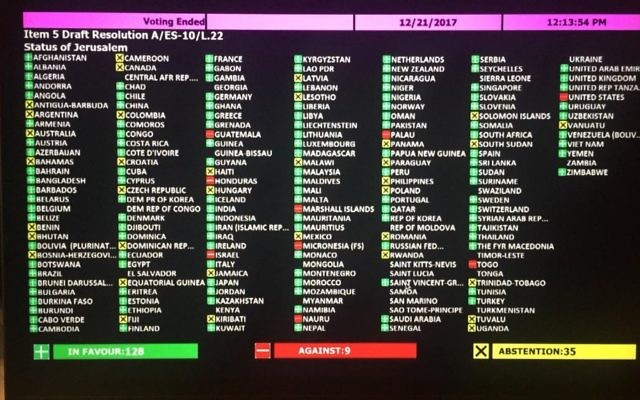U.N. Vote on Jerusalem Exposes Bias
The anti-Israel bias that prevails among U.N. member states breeds hypocrisy time and time again.
Every country in the world has the right to designate its own capital. Thus, recognition of Jerusalem as the capital of the state of Israel should not be controversial.
Yet, since Israel declared independence in 1948, the international community has denied the Jewish state the same privilege that all other U.N. member states enjoy. President Donald Trump’s Dec. 6 declaration that the United States does indeed recognize Jerusalem as Israel’s capital acknowledged the reality that Israel’s government is there and the historical truth of the connection between Jews and Jerusalem for more than 3,000 years.
Importantly, for those who listened carefully to the entirety of the president’s remarks or read the text, such recognition did not in any way preclude resolving the final borders of Jerusalem or achieving a negotiated two-state solution. And when the U.S. Embassy does move from Tel Aviv to Jerusalem, it will be in western Jerusalem, which always has been under Israeli sovereignty.
But the reaction, first by Palestinian leadership, then by much of the international community, raises questions about the legitimacy of Palestinian claims of wanting peace.
Palestinian Authority President Mahmoud Abbas deliberately distanced Palestinians from the United States.
“Jerusalem is and will forever be the capital of the Palestinian state. We do not accept any role of the United States in the political process from now on because it is completely biased towards Israel,” Abbas said in reaction to the Trump declaration.
Rather than use the change in the state of affairs as an opportunity to promote peace, Abbas has chosen to push that prospect further away. Trying to sideline the United States, which historically has been key to facilitating Arab-Israeli negotiations, is irresponsible and mirrors a historical unwillingness on the part of the Palestinian leadership to negotiate in good faith.
In 2000, Israeli Prime Minister Ehud Barak (with the support of President Bill Clinton) offered a two-state solution to Yasser Arafat, including a compromise on Jerusalem. Arafat summarily rejected the offer, told Clinton that there was no historical connection between Judaism and Jerusalem, and soon thereafter launched the Second Intifada.
In 2008, Israeli Prime Minister Ehud Olmert offered another two-state solution to the Palestinian Authority. His proposal received no formal response from Abbas.
In 2010, in conjunction with the Obama administration, Prime Minister Benjamin Netanyahu agreed to a 10-month settlement freeze to bring the Palestinians back to the table. Once again, the PA failed to show up.
So I ask: Where is the Palestinian plan for peace? Let’s recall that the first two-state solution was approved by the U.N. General Assembly on Nov. 29, 1947, when the world body adopted a resolution to partition the British-governed territory of Palestine into Arab and Jewish states. The Jews accepted and created Israel, while the Palestinians, and the Arab world, firmly rejected the proposal.
The General Assembly voted 128-9 on Thursday, Dec. 21, to condemn Trump’s decision to recognize the reality of Jerusalem as Israel’s capital. This body did not take action to encourage a resumption of bilateral peace talks between the Israelis and Palestinians.
Eight countries, including Guatemala and Honduras, voted no with the United States. Additionally, 35 member states abstained, including Canada and Uganda. And 23 did not even vote.
The vote, however, was not surprising. The anti-Israel bias that prevails among U.N. member states breeds hypocrisy time and time again.
European nations that are witness to the contemporary resurgence of anti-Semitism within their borders voted to condemn Trump’s decision. South American, African and Asian nations that are guilty of reprehensible human rights violations voted to condemn the decision.
Perhaps most egregious yet unsurprising, Arab nations that could have prevented the situation from ever reaching this point voted to condemn this decision.
These same Arab nations must be willing to stand on the side of progress and stability. The opportunity to make peace will rise again and must come soon. When it does, Israel’s Arab neighbors must play an active role in pushing Palestinian leaders to return to the negotiating table to achieve, with Israel, a comprehensive and sustainable peace.
At that point the false controversy of a recognized Israeli capital in Jerusalem will cease, and the flowering of our shared redemption will begin.
Jeffrey Silverstein is the ACCESS associate in the American Jewish Committee Atlanta office.




comments